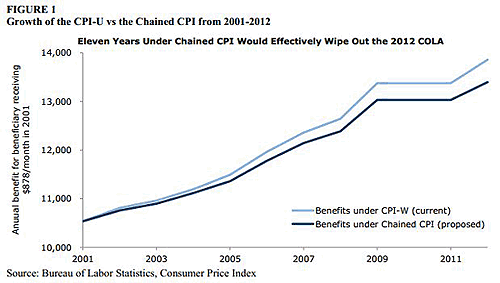NATIONAL
What they mean when they say ‘entitlement reform’
 (Jan. 7, 2013) — With the year-end agreement averting the so-called fiscal cliff, Congress temporarily averted demands by Republican leaders to cut Social Security and Medicaid (among other things). But significant benefit cuts in these programs, which conservatives like to call “entitlement reforms” despite the fact that Americans have paid for these programs all of their working lives, are still a very real possibility as the latest round of debt-ceiling negotiations commences.
(Jan. 7, 2013) — With the year-end agreement averting the so-called fiscal cliff, Congress temporarily averted demands by Republican leaders to cut Social Security and Medicaid (among other things). But significant benefit cuts in these programs, which conservatives like to call “entitlement reforms” despite the fact that Americans have paid for these programs all of their working lives, are still a very real possibility as the latest round of debt-ceiling negotiations commences.
So what types of benefit cuts have Republicans and some Democrats, including President Obama, proposed for Social Security and Medicare? They range from raising the retirement age to means testing to imposing something called a “chained CPI.” Here is an explanation of what that means and why these proposals are all aggressively opposed by organized labor.
RAISING THE RETIREMENT AGE — On the floor of the U.S. Senate, Sen. Tom Harkin (D-Iowa) explained why this is a bad idea for working Americans. He reminded his colleagues not only that the age for receiving full Social Security benefits was recently raised from 65 to 67, but that this particular cut unfairly targets low- and middle-income workers who have lower life expectancies.
Raising the retirement age also disproportionately harms racial minorities. The latest data shows life expectancy of black males is only 70.8, which is nearly six years behind non-Hispanic white men, whose life expectancy is 76.2.
CHAINED C.P.I. — Alex Stone of the Puget Sound Advocates for Retirement Action offers the following explanation:
There are different types of Consumer Prices indexes, for example, the CPI-W (which measures cost inflation for urban wage earners), and the CPI-U (for all urban consumers) and CPI-E (which measures the cost of inflation for seniors by tasking into account the additional amount seniors pay for health care costs) . We have advocated using the CPI-E when calculating the cost of living increase for purposes of Social Security benefits, but it is not currently in use.
The Chained CPI (C-CPI) is also a different type of index. The biggest thing to note is the Chained CPI shows a lower rate of inflation than the currently-used CPIs. This index measures the price of a basket of goods that changes in response to the relative price shifts of different goods as opposed to the CPIs, which remain fixed over time. Here’s an example: a rise in the price of chicken leads people to buy less chicken and more cheese. The Chained CPI assumes people will substitute lower priced goods for higher priced goods (like cheese instead of chicken), and thus it the Chained CPI rises at a lower rate of inflation than other indexes.
Read more here.
MEANS TESTING — Posted today at AFL-CIO Now is the following explanation for why this idea is “a real dud.” Means-testing Social Security and Medicare is an idea thrown around a lot to “find savings” because, on the surface, it doesn’t sound too painful. Wealthy people typically are able to save more and invest in retirement than lower- and middle-income earners, so they don’t need Social Security and Medicare as much, right? Wrong. Means-testing Social Security and Medicare is a cynical way to weaken and destroy benefits for middle-income working people. Lynn Stuart Parramore at Alternet writes:
In Washington-speak, “means-testing” is a scheme to deny or reduce Medicare and Social Security benefits for people who are “too wealthy” in the name of saving money. It’s a counterproductive, harmful idea, but one that well-intentioned liberals often get snookered into embracing.
Parramore spoke with several economists to discuss six reasons why means testing is a real dud: 1. Means-Testing Undermines Progressive Values Parramore writes:
At their heart, programs like Medicare and Social Security are about fairness, equality and shared citizenship, values that progressive Americans hold dear. Medicare and Social Security are not welfare programs. They are benefits that people pay for as they work. They are also smart social insurance programs that spread risk across society in order to protect everyone at rates no private insurance scheme, with its much smaller risk pool, could touch.
She spoke with economist Joseph Stiglitz, who added, “We don’t means-test public education because we believe that we want people to have the same opportunities and we lose out on that with means-testing.” 2. Means-Testing Won’t Stop at the Wealthy This is where we get into the nitty-gritty that means-testing Social Security will actually cut benefits for middle-income earners… even people who make around $60,000 a year and less. Those are not the people we usually think of as being wealthy. In order to produce any significant savings, people typically considered middle class will be affected. Political economist Thomas Ferguson told Parramore:
The truth is that means-testing is a device to destroy political support for what are still the most popular of all government programs—programs that have survived decades of attacks by the right.
3. Means-Testing Doesn’t Make Economic Sense It’s simply untrue that means testing produces great savings, writes Parramore.
In fact, it will likely raise costs for middle- and lower-income seniors who rely on Medicare and Social Security to live decently in retirement….Means-testing will cause many high-income beneficiaries to view the programs as unfair, and they will opt out, purchasing their own insurance and retirement policies on the private market. Programs like Medicare and Social Security depend on spreading risk across a large pool of people. For example, the departure of higher-income beneficiaries from Medicare, who tend to be younger and healthier, would increase overall costs and diminish public support.
4. Means-Testing Plays into Conservative Deficit Hysteria Even entertaining the idea of benefit cuts through means-testing suggests that Social Security is in crisis. It’s not.
Conservatives promote deficit hysteria because they have a fundamental hatred of government and wish to destroy the New Deal programs that have benefited the middle class and the poor. If they were really concerned about deficits and spending, they would not support costly and unnecessary wars, monopolistic conditions and extremely low taxes for the wealthy and large corporations….Social Security does not contribute to the deficit. It is a well-managed program in fine fiscal condition, and there is no justification for tampering with it now. The Trustees Report shows that the program will be able to meet all of its obligations at least until 2033. If there is a tweak needed down the road, that can be handled very simply by raising the cap, which stands now at just over $100,000.
5. Creeping Means-Testing Is Already Happening Wealthier people already pay more for Medicare.
Medicare was started in 1965 to provide health insurance to people 65 and older regardless of their medical history or income. Since then, 75% of the program’s Supplementary Medical Insurance (SMI), the part that goes to pay doctors, has been financed by general revenues, the largest chunk of which comes from personal income taxes. The personal income tax is progressive, which means that upper-income people pay a larger share of their income in taxes for SMI. Since 2007, specific means-testing features have been added. For example, beneficiaries with incomes over $85,000 have been required to pay higher SMI premiums. Beginning in 2013, the 2.9 percent hospital insurance tax will continue to apply to the first $200,000 of income for individuals or $250,000 for couples filing jointly, but it will rise to 3.9 percent on income in excess of those amounts.
6. The Coming Old Age Crisis A secure retirement is quickly becoming a thing of the past with vanishing pensions, a shaky job market, declining wages and constant attacks on Social Security and Medicare. We need more robust Social Security and Medicare benefits, not less.
The United States is a rich country, and a dignified retirement for our elderly should be one of our proudest achievements. And yet Social Security and Medicare are under near-constant attack. Pensions are vanishing, and despite 401(k)s and other voluntary retirement plans, workers still can’t save nearly enough to retire securely. [Economist Teresa] Ghilarducci warns that the economic structure of retirement in America is falling apart. She exposes the Wall Street financiers who want to privatize Social Security, the risk of 401(k) plans, do-it-yourself retirement schemes and companies like Enron that have left employees high and dry.
Read Parramore’s article on Alternet: 6 Reasons Joseph Stiglitz and Other Top Economists Think Means-Testing Medicare & Social Security Is a Destructive Idea.






